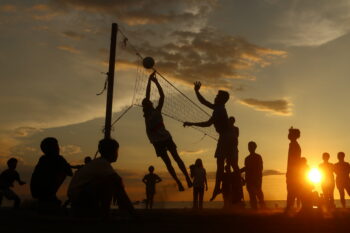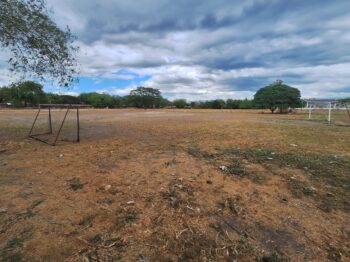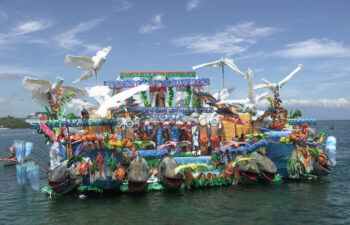
NAAWAN, Misamis Oriental (MindaNews / 23 Sep) – Hundreds of dead fish floated in waters off the Baseco compound in Manila Bay in the morning of September 17.
To suggest that the fish were poisoned or dynamited by illegal fishers is senseless, if not insane. Why would these illegal fishers abandon their precious loot and allowed everybody to see them floating around?
Also, to attribute the fish kill to a sabotage to discredit the dolomite beautification project, based on the presence of Tilapia, claimed as a freshwater fish from Laguna de Bay, among the dead fish, is irresponsible and a careless display of ignorance. Tilapia is a euryhaline species, a fish that can survive wide salinity variance from 0 ppt to as much 40 ppt. In other words, the fish may thrive in both fresh water and seawater and therefore may be found in Laguna de Bay and Manila Bay.
The truth of the matter is the floating fish drowned from the filth of Manila Bay. Dirty waters kill.
The Manila Bay and other bodies of waters that are sinks to effluents from water treatment facilities or wastewaters direct from industries, commercial establishments, households and runoffs from agricultural activities, are likely to experience fish kills now and then. The liquid pollutants carry heavy load of ammonium nitrates and phosphorous that, at certain concentration level in the fish tissue may kill the fish. But this is not what triggers a fish kill or the death of voluminous fish in one sitting.
Fish kill primarily results from depletion of dissolved oxygen particularly in a highly polluted water body. The main driver of oxygen depletion is the excessive growth of algae and phytoplankton caused by high level of phosphorus and nitrogen, natural fertilizers that are generally abundant in polluted waters.
The photosynthetic activity of the aquatic plants at daytime is highly beneficial to the fish and other marine animals: the plants take in the carbon dioxide (CO2) in the surrounding and gives off great amount of oxygen needed by fish and other marine animals to survive.
At nighttime, the photosynthetic process is reversed; the aquatic plants in respiration, consume oxygen, competing thus with the marine animals, and give off carbon dioxide that pollutes the surrounding. Moreover, dead and decomposing plants along with the bacteria that feed on them demand oxygen and give off carbon dioxide as well, which pollutes and further deplete the dissolved oxygen (DO) in the water. Additionally, a sudden die off of the plankton in bloom resulting from a sudden change of weather, say, from a very hot and dry morning to a downpour in late afternoon may aggravate oxygen depletion.
The fish start dying often at past midnight when reduced DO and high CO2 begin to suffocate them and mass kill occurs often at dawn where DO is at its lowest. When DO goes down to 3 mg/l even the hardiest fish in the vicinity dies. By daybreak, volumes of fish will already be floating on the water surface.
Some fish though manage to go up to the surface to gulp for precious air. If the fish manage to survive up to daybreak, that is, when the sun restores the daytime plant photosynthesis, they will live for another day. But they may not in wastewater sink where some oil slick may prevent them from breaking the water surface, and negate them the instinct to gasp for air in order to survive an adverse condition.
In wastewater sinks like Manila Bay where commercial vessels are harbored, oil spill is common. The oil film on the water surface obstructs air and water contact, preventing DO replenishment and directly contributes to the occurrence of fish kill.
Hench, to cleanse the bay and its tributaries of pollutants is the first order of the day to save Manila Bay. This should be the focus of the presidential task force on Manila Bay rehabilitation, in consonance with the Supreme Court continuing mandamus to restore or improve the quality of the Bay waters.
The order is to clean up not to put some make up on Manila Bay.
(MindaViews is the opinion section of MindaNews. William R. Adan, Ph.D., is retired professor and former chancellor of Mindanao State University at Naawan, Misamis Oriental, Philippines.)







